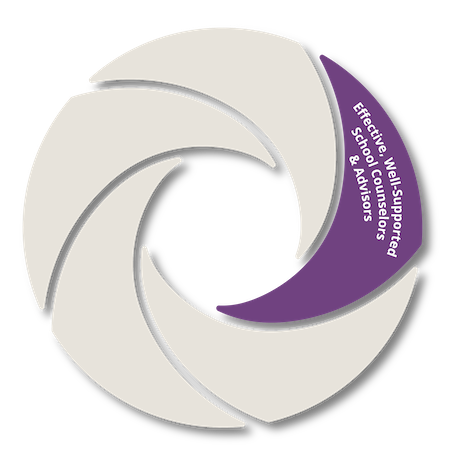District and Campus Commitments
These commitments describe the roles and responsibilities of the administrators who support, supervise, and manage the school counseling program staff.
- Administrators recognize the recommended school counselor to student ratios that support the district’s overall comprehensive school counseling program.
- Administrators provide training to equip school counselors to lead a program that is free from bias and inclusive of all students.
- Administrators provide ongoing opportunities for relevant professional development for school counseling program staff that is connected to their appropriate scope of work and extends their ability to implement the program with fidelity.
- Administrators use an annual evaluation system for school counseling program staff with metrics grounded in student growth and success to identify low and high performers, allowing for opportunities to develop low performing staff.
- Administrators allocate sufficient time for regularly scheduled meetings with school counselors and engage in decision making processes that support the implementation of the school counseling program.
- Administrators identify and allocate sufficient funds to ensure access to necessary resources for successful ongoing advising program implementation, according to TEA’s recommended use of funds.
Essential Actions
These actions describe what the most effective school counseling program staff do to implement and continuously improve an individual planning system.
Key Practices:
- School counseling program leader(s) identify and cultivate potential candidates for future vacancies by creating an internal pipeline for interested district staff and designing a mentor experience for candidates who are in the process of becoming certified school counselors or advisors.
- School counseling program leader(s) coordinate with administrators to identify and partner with feeder institutions who can support the talent pipeline of new school counselors and advisors and obtain assistance from their regional support center in locating potential candidates.
- School counseling program leader(s) develop and implement a training experience for all new school counselors and advisors to appropriately onboard them to the individual planning system within the district’s school counseling program.
- All new and returning school counselors and advisors complete recent, high-quality training specific to their roles in effective advising service delivery on an annual basis.
Key Practices:
- School counseling program staff evaluations are managed by a qualified campus leader who is well-versed in school counseling and advising responsibilities. Whenever possible, it is recommended that evaluations are completed by someone who has been a certified school counselor or is trained in effective advising and the Texas Model for Comprehensive School Counseling Programs.
- School counseling program staff performance and progress is routinely tracked over time using normed evaluation tools and processes along with student data.
- The frequency of check-ins and evaluation cycles are determined based on school counseling program needs, student short- and long-term outcomes, and district evaluation system guidance.
Key Practices:
- School counseling program staff growth and learning is supported by professional development to successfully facilitate all students’ academic, career, personal and social development as well as financial literacy.
- School counseling program staff members engage in professional development on and off-campus, including, but not limited to the following:
- Participating in professional associations
- Visiting colleges and trade schools
- Training on financial aid
- Engaging with employers and employment opportunities in high-growth, high-demand occupations or industries
- Continuing professional education on research of best practices from the field
- Collaborating consistently across advising, counseling, and instructional staff for knowledge sharing opportunities and partnership
- Receiving training on CTE programming and application, to include programs of study, work-based learning, CTE course offerings, industry recognized certification offerings, and Comprehensive Local Needs Assessment baseline data
- Participating in mentorship experiences with a highly effective, experienced advisor in the district

